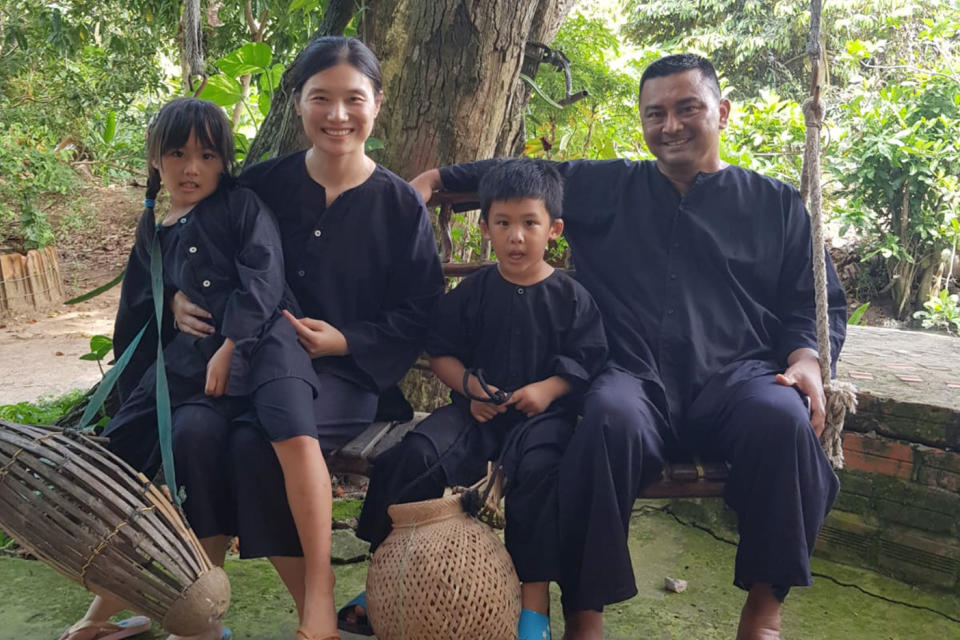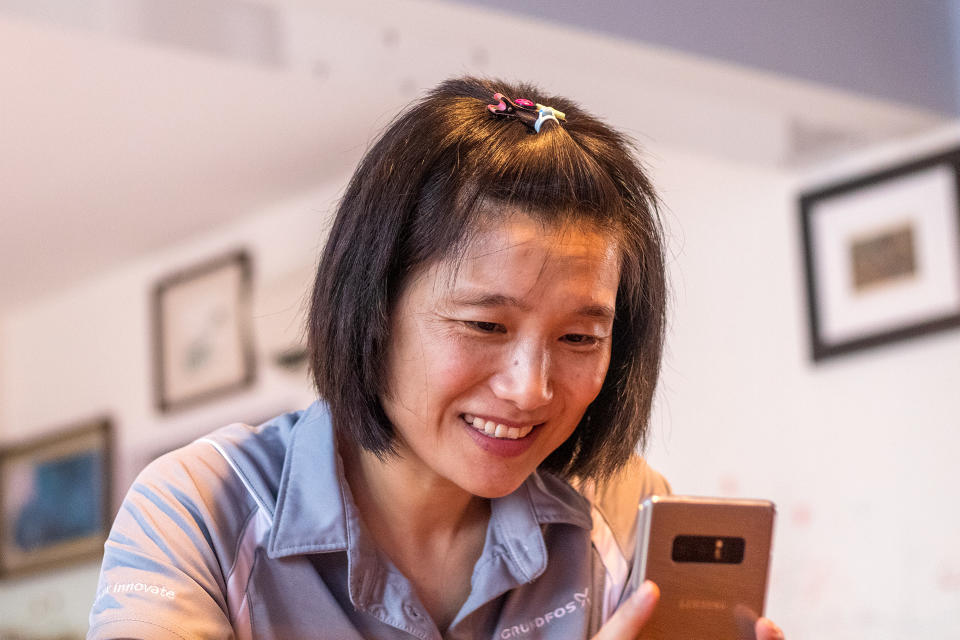'Mummy, when are you coming home?': A Singaporean family separated by COVID-19
SINGAPORE — The last time Qu Haiyan, 41, saw her husband and two children in the flesh, it was through a wired fence from a distance of about 150 metres, as guards patrolled the surrounding area.
“That was a very, very good Valentine’s Day,” the Wuhan native and Singapore permanent resident told Yahoo News Singapore, beaming at the memory. Qu was serving a mandatory 14-day quarantine order at Heritage Chalet at the time, having flown to Singapore on a second evacuation flight from Wuhan amid the COVID-19 outbreak, and could not have contact with anyone.
And so, her Singaporean husband Faisal Bushfield, 54, and their children Arden, 5, and Ariane, 6, came to visit, having completed their own quarantine orders the day before. They could not enter the compound but brought her a delivery of instant noodles - and a rose. Then they walked around the Pasir Ris Park side of the fence to where they could see her two-storey unit.
Qu called Bushfield on her mobile, and the housewife popped her head through the window to see her family waving at her. “We couldn't hug, we couldn't really talk. But it was really good to see them with my own eyes, not through the video calls.”
It was the first time the family had seen each other since 29 January, when Bushfield and the kids left Wuhan on the first evacuation flight home. Qu would have been with them, but Chinese authorities informed Singapore consular officials at the last minute that Chinese nationals were not allowed to leave the country. The family had been on their annual trip to Wuhan to celebrate the Lunar New Year.
It will likely be months more before the family can be reunited again in Taichung, where they have been based since 2018. On 6 February, as part of measures to contain the spread of the virus, Taiwanese authorities barred Chinese citizens from entering the country. Bushfield was later informed that exceptions would only be made for Chinese nationals married to Taiwanese citizens.
For now, Qu is living with roommates at their old family home in Simei, while her husband continues to lobby both Singaporean and Taiwanese authorities on her behalf. Her parents and younger brother remain in Wuhan, while her in-laws live in the United States.
And while she is “relieved” that she has not contracted the coronavirus - “before, I was wondering whether I’m carrying something or not” - Qu confessed to feeling “a little bit lost”.
“What am I going to do do? When am I going home?”
‘It is what it is’

3,116 kilometres away in Taizhong, Bushfield and the children are getting on with things, having arrived in Taiwan on 15 February. The only difference is that Bushfield is doing it all on his own: making breakfast, sending the children to school, going to work, picking them up, preparing dinner, doing housework and putting them to bed.
Bushfield, who works for Danish pump manufacturer Grundfos, brought the children back to Taiwan as the couple decided that it was important for them to get back to their normal routine. Asked if it is hard being the single parent, he said, “Yeah, but I don’t think so much about it. It’s just something that has to be done, so I might as well stay positive.”
He is also mentally prepared to be by himself for the next few months. But Bushfield is also frustrated - he pointed out that Qu has not lived in China for a decade and holds a valid residency permit for Taiwan. She was also quarantined for two weeks in Singapore and twice tested for the virus.
“This policy is separating families. I can understand their concerns about not wanting Chinese nationals in… we are more than willing for her to be quarantined here,” said Bushfield.
“But at least bring the family together.”
In response to queries, the Taipei Representative Office in Singapore directed Yahoo News Singapore to the National Immigration Agency website, which details the policy on entry requirements for Chinese nationals. And with multiple countries imposing travel restrictions in a bid to stop the spread of the virus, it is likely that there are many more separated families like the Bushfields.
Dilemma in Wuhan

On their last night together in Wuhan, the couple had just hours to decide whether to board the evacuation flight. “I don’t think there was like a big conversation between us,” said Qu. “I just told him: ‘I’ll unpack my stuff. You guys go ahead.’ I know once they get to Singapore, they are in good hands.”
Ultimately, practical considerations ruled. Bushfield, who has a heart condition, was running out of medication and had developed an ear infection. Qu also felt it would be too much to expect her mother to cook for six people every day.
She added, “There was a voice in my heart telling me: my parents need me more.”
So for the next 11 days, the family lived in lockdown - “my mom still cooked three meals every day” - only venturing out to buy groceries. “You have never seen Wuhan or Chinese cities like this: so quiet, so spacious and so peaceful,” said Qu. And while none of her friends or extended family got sick, Qu would often see desperate families “crying for help” via WeChat messages.
When Qu was eventually allowed to leave her home town on 8 February, it was a struggle. By then, more than 40,000 had been infected in mainland China, with 811 deaths. With media reports that elderly people were particularly susceptible to COVID-19, she feared for her parents.
“What eventually changed my mind was your article,” she told this reporter. Speaking of the decision to leave Wuhan without his wife, Bushfield had said, “What if something happens to her and I’m not there? Can I live with that?”
Her husband did not tell her that. “I guess that’s men. They don’t talk about their emotions or feelings.”
‘I started to panic’
The scene at the airport, said Qu, was “chaotic”, with Singaporeans, Australians and Britons all being evacuated. “I’ve never seen such a queue in the airport. I got to the airport around 10am. It (the plane) took off around 4am.”
It is ironic to think that before Qu arrived in Wuhan on 4 January, a Taiwanese friend who majored in public health had warned her to be careful of the virus. “I was actually laughing in my mind, thinking, okay, this is no big deal, because the government says it’s okay.” Her kids were even taking ice skating lessons - until the number of infections in Wuhan rose dramatically.
After being quarantined in Singapore, Qu could not sleep for the first few days. She discovered that the mother of a close friend had died of the virus. “I never felt it was so real and close to me before that,” she said.
Qu belatedly realised that many of her friends and family members did not have face masks. “I guess that’s when I started to panic.” Frantically contacting overseas friends in Canada and the Netherlands for help, she eventually spent $2,000 on purchasing and shipping masks to Wuhan.
Qu later passed the time exercising and watching TV dramas like “Friends”. “It’s something I watch whenever I feel upset. It can always cheer me up.”
‘Mommy, when are you coming home?’
For now, Qu is staying put in Singapore. She calls the family daily and has been working out. She is also thinking of volunteering with a charity. Qu added with a laugh, “Faisal was joking with me, maybe they do need volunteers, but if they know you are from Wuhan, I'm not too sure if people want you.”
And what does she tell her children when they ask when she is coming home? “We try to keep the answer simple and not so specific. I tell them I'm staying here because people here want to make sure everybody's safe before we can travel again.”
Qu also flirts with thoughts of flying to a third country to meet her husband: he was initially scheduled to fly to Thailand for a meeting. “But then we were talking about the kids: whether we leave the kids behind in Taiwan, or bring them to Thailand. And then as the situation in Thailand is not really good, I suggested to him he should not go. What if he's stuck in Thailand?”
She added with a sigh, “But then I was thinking: maybe they should go and I can go to Thailand. And then I kill that thought immediately. I didn't even tell him I was thinking of that.”
Asked what she wishes for most, Qu said emphatically, “I want to go home. (I want) to hug them. Listen to my kids mumble, making stories and telling me everything.”
Stay in the know on-the-go: Join Yahoo Singapore's Telegram channel at http://t.me/YahooSingapore
Related stories:
Coronavirus: Family reunions on hold as more Singaporeans return from Wuhan
Wuhan virus: Quarantined in Singapore, longing for family in China
Coronavirus: Singapore mounts second evacuation flight from Wuhan

 Yahoo News
Yahoo News 

